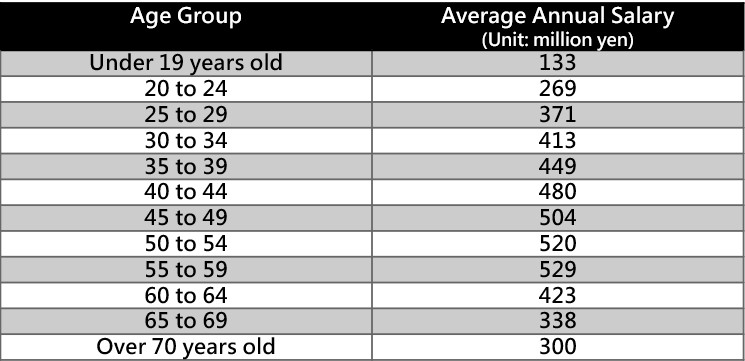Japan is one of the countries where many people yearn to go to work. In recent years, the prices have risen, but the salary level has not risen proportionally, so life has become more difficult. The average annual private salary announced by the Japanese National Tax Agency is 4.43 million yen, and it is more likely to reach this level after the age of 35, which makes many people feel great pressure in life.

(Photo via unsplash.com)
TAIPEI, TAIWAN (Merxwire) – Japan is one of the countries where many people yearn to go to work, but can the salary level catch up with the soaring price index every year? According to the private salary survey results of the Japanese National Tax Agency (NTA), the average annual salary in Japan in 2021 will be 4.43 million yen, and it is not possible to reach this level until the age of 35, which makes people sigh that it is not easy to live in Japan. This survey result also appeared on the Twitter trending list.
Japan has many popular tourist attractions, drawing many tourists every year. Advanced technology, clean streets, beautiful scenery, and delicious food are all factors that attract tourists. Of course, many people also yearn to work and live in Japan. However, prices and housing expenses in cities have remained high, and when the yen fell, prices soared. The Tokyo consumer price index has been higher than the Bank of Japan’s 2% inflation target for 13 consecutive months, causing many foreign workers to leave Japan and return to their hometowns to work.
According to the domestic average annual salary survey conducted by Orix Bank of Japan, the average annual income of those under the age of 19 is 1.33 million yen. Young people aged 20 to 24 have an average annual salary of 2.69 million yen. The salary of office workers aged 25 to 29 exceeded 3 million yen, with an average of 3.71 million yen. The average annual salary of 30 to 34-year-olds is 4.13 million yen, which has not yet reached the average annual salary level. That is to say, the average annual salary standard of 4.43 million yen can only be achieved by those over the age of 35.
Japanese financial media “FINANCIAL FIELD” actually calculates that the monthly income that office workers can spend is about 300,000 yen, because income tax, resident tax, and social insurance must be deducted first. After deducting these expenses, about 80% of the annual salary is left, which is 3.5 million yen. And various expenses will also depend on the actual family size.
According to the 2022 Household Budget Survey Report of the Ministry of Internal Affairs and Communications of Japan, the average consumption expenditure of a single family is 161,753 yen, of which food expenditure is 43,276 yen and accommodation expense is 23,322 yen. Excluding accommodation costs, the average monthly expense is about 130,000 yen. Housing costs are not so high because many people own or live in the house of their family. Therefore, if you are single and do not consider savings, you still have a monthly budget of 170,000 that can be used for housing.
The average monthly consumption expenditure of a household with two people is 290,865 yen, of which food expenditure is approximately 81,888 yen, and accommodation expense is approximately 18,652 yen. If accommodation expenses are deducted first, the consumption expenditure is reduced to 270,000 yen, leaving only 30,000 yen for other uses. Compared with single-person families, life will be harder and they need to save more. If it is a double-income family, the situation will be slightly better. But in terms of Japan’s national conditions, the proportion of women working after marriage is lower, especially for families with children, the cost will be higher, and the proportion of women working is much lower.

(Chart via Merxwire)
On an annual basis, a single-person household can save approximately 1.68 million yen a year without any additional expenses. A family with more than two people can only save 10,000 yen a month, and only 120,000 yen a year. The amount is quite small, and it is difficult to cover temporary large expenses, so their life is under great pressure. Financial experts suggest that to maintain a more comfortable life, you must save more while you are single to cope with the increased expenses and difficulties in saving after you get married.
Therefore, there is now a wave of foreigners returning home from Japan, especially the grassroots workers in Southeast Asia who were originally engaged in the service industry. Many people are overwhelmed by rising prices, so they choose to return to their hometowns to work. Compared with natives, the accommodation costs for foreign workers are often higher, becoming another burden in addition to high prices.
It is popular among Japanese people to save money on lunch. Some people only eat breakfast and dinner and skip lunch to save more money. Some people also bring simple food from home for lunch to reduce the cost of eating out. Many people limit themselves to buying food within 500 yen for lunch, which is called a coin lunch. To save for their children’s education expenses, some parents choose higher-paying hours, such as night shifts, to earn more salary to meet the high expenses. They also choose to live in a suburb where the one-way commute takes more than an hour to save money.
Therefore, if you want to try to work in Japan, you must make short-term and long-term financial planning. Choose to commute to work in an area where the cost of renting or buying a house is relatively low, learn from Japanese housewives to go shopping during supermarket discount hours, and try not to eat out. Remember to make stable and value-preserving financial investments for the money you save, so that you can enjoy the good living environment in Japan more comfortably and stress-free, and settle down for a long time.





